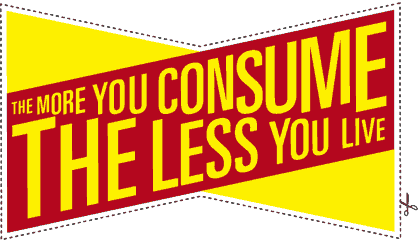November 25, 2003
Today on MorningWood

|
Help me get an afternoon show! There is an opening for a programmer on Saturday afternoon. Email WMNF Program Director Randy Wynne and tell him how much you would just LOVE to hear Norwood on from 2-4 PM on Saturdays! I know: I’ll have to come up with another catchy name, but I’m willing to make the sacrifice.
Welcome to the MorningWood Buy Nothing Day special.
Stop Shopping. Start Living. Buy Nothing
Since its launch in the Pacific Northwest twelve years ago, Buy Nothing Day has grown into a worldwide celebration of consumer awareness and simple living. Observed on the day after US Thanksgiving – America's busiest shopping day of the year – the campaign has sparked debate, radio talk shows, TV news items and newspaper headlines around the world.People in more than thirty countries have made a pact with themselves and, as a personal experiment and public statement, stepped out of the consumer stream for 24 hours. The ways in which people have marked the event worldwide have been as diverse as the participants themselves.
Many play with the icons of our consumer landscape by taking off on mock shopping sprees, by hawking "hope" and "happiness," or simply by opening up shop and selling nothing more.
The daredevils of the Ruckus Society, a California-based direct-action group, dropped a boxcar-sized banner ridiculing overconsumption smack in the middle of the Mall of America. Other more down-to-earth-types created and distributed the Gift Exemption Voucher – a polite way of saying, Let's not get each other anything this year, out of principle. In Seattle, helpful Buy Nothing Day celebrants offered a credit-card cut-up service outside a downtown mall.
In America, Buy Nothing Day played out in some of the nation's last remaining public spaces - its malls. Costumed groups of revelers managed to slip in and stay long enough to set up tables and suggest alternatives to heavy holiday spending such as giving to charity. Spend time with family and friends, rather than money on them, was the message. Yes it's cliche, but, the things most worth pursuing, and exchanging - love, ritual, attention, sacrifice, freedom-are the things no-one can buy.
Buy Nothing Day just wouldn't be the same if the networks didn't reject our opt-not-to-shop TV uncommercial. Every season, we approach ABC, CBS and NBC to air the spot, and every year they refuse us–claiming our ad asking people not to buy anything threatens "the current economic policy of the United States." It will be interesting to see if this year CNN Headline News, the one show that has taken our money and aired the spot (after their "Dollars and Sense" program since 1996) continues to break ranks.
Most constitutional-law experts aren't bothered by the networks' refusal of the spot, according to Robert Berner in The Wall Street Journal. Networks aren't under any legal obligation to air it. But as Harvard Law School Professor Laurence Tribe remarked, "At least the networks make it clear who butters their bread."
Since September 11th much has changed, yet much remains the same. Despite an enormous body of evidence warning of the dire consequences of fossil-fuel-induced climate change, including massive floods in Europe and crippling droughts on Canadian prairies, consumption of oil has scarcely slackened. Bush's thinly-veiled quest for domination over Middle Eastern oil reserves promises to perpetuate this trend. The ongoing "war on terrorism" has sharpened our appreciation of how tenuous and potentially catastrophic is a voracious First World's dependence on foreign oil, networked international money markets, and the utterly uncompassionate survival instincts of multinational corporations.
Lost in the breast-beating is any critical discussion of the *point* of all this economic patriotism. The goal is to boost the flagging gross domestic product. The GDP is the usual measurement of the strength of the economy, but how useful is it? Consider that whenever there's an ecological or human disaster in the U.S., the GDP goes up, and we call it "progress." By that logic, the crash of those jets into the Twin Towers was a good thing, because it, too, sent the GDP up (or it almost certainly would have, with new billions spent on defense and health and cleanup, had the fear factor not kicked in). The point is, we measure the goods, but we do not measure the bads – and, unchecked, it’s the bads that will bury us. (For more on this subject, check out the website of the folks at Redefining Progress in San Francisco. www.rprogress.org) Overconsumption creates long-term ecological problems that aren't accounted for in the GDP. That’s one of the things Buy Nothing Day is all about.
There’s no right way to celebrate Buy Nothing Day. The idea is to do *something* to spark up debate, not shut it down. The shining hope for a revolution in human consciousness lies in the actions of everyday people. And so in the most profound sense, nothing has changed at all.
WMNF is a non-commercial community radio station that celebrates local cultural diversity and is committed to equality, peace and social and economic justice. WMNF provides broadcasts and creates other forums to serve the community by the exposure and sharing of these values.
Posted by Norwood at November 25, 2003 02:51 AM